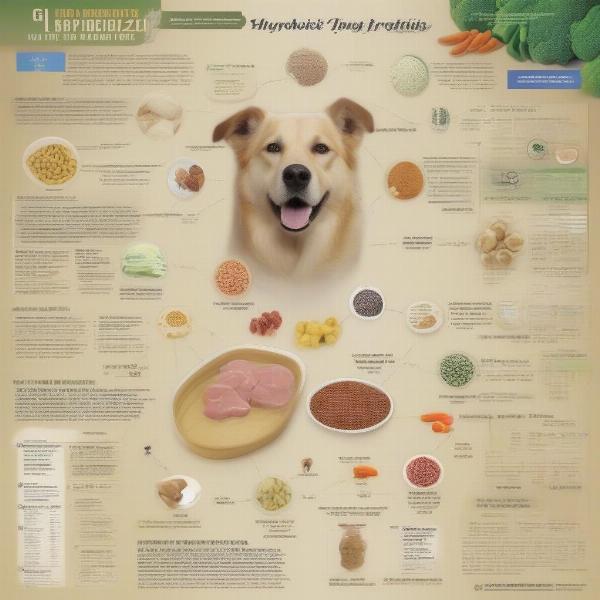Gastrointestinal (GI) dog foods are specifically formulated to support dogs experiencing digestive issues. These specialized diets can help manage a range of problems, from sensitive stomachs and diarrhea to more serious conditions like inflammatory bowel disease (IBD). Choosing the right GI dog food is crucial for your dog’s comfort and overall health. This guide will explore various aspects of GI dog foods, helping you make informed decisions for your furry companion.
Understanding Gastrointestinal Issues in Dogs
Just like humans, dogs can suffer from a variety of digestive problems. These can manifest in symptoms such as vomiting, diarrhea, gas, loss of appetite, and weight loss. Identifying the underlying cause of these symptoms is critical for effective treatment. While some issues may be temporary and resolve on their own, others may require long-term dietary management.
Key Ingredients in GI Dog Foods
GI dog foods are designed with specific ingredients to soothe and support the digestive system. Highly digestible protein sources, such as hydrolyzed proteins or novel proteins like venison or duck, are often included to minimize allergic reactions and ease digestion. Fiber sources, like prebiotics and probiotics, can help regulate bowel movements and promote a healthy gut microbiome.
 Key Ingredients in Gastrointestinal Dog Foods
Key Ingredients in Gastrointestinal Dog Foods
Choosing the Right GI Dog Food for Your Dog
Selecting the appropriate GI dog food depends on your dog’s specific needs and the underlying cause of their digestive issues. Your veterinarian can recommend the best course of action, including the right type of GI diet. Some dogs may benefit from a low-fat diet, while others might require a high-fiber formula. It’s essential to follow your veterinarian’s advice and monitor your dog’s response to the new diet.
Transitioning to a GI Dog Food
When introducing a new GI dog food, gradual transition is key to avoid further upsetting your dog’s stomach. Start by mixing a small amount of the new food with their current food, gradually increasing the proportion of the new food over several days. This allows the digestive system to adjust to the new diet and minimizes the risk of adverse reactions.
Common Questions about GI Dog Foods
1. How long should my dog stay on a GI diet? This depends on the underlying condition. Some dogs may require a GI diet for a few weeks, while others may need it long-term.
2. Are GI dog foods expensive? GI dog foods are often more expensive than regular dog foods due to their specialized ingredients and formulation.
3. Can I give my dog treats while they are on a GI diet? It’s best to consult your veterinarian before giving treats, as some treats may interfere with the effectiveness of the GI diet.
4. What are the signs that my dog’s GI issues are improving? Look for improvements in stool consistency, reduced vomiting, increased appetite, and weight gain.
5. Can I make homemade GI dog food? While possible, it’s crucial to consult a veterinary nutritionist to ensure the homemade diet meets all of your dog’s nutritional needs.
6. Are there different types of GI dog foods for different conditions? Yes, there are various formulations available, including low-fat, high-fiber, and hydrolyzed protein diets.
7. What if my dog doesn’t like the GI dog food? Try different flavors or brands. You can also try mixing the GI food with a small amount of boiled chicken or plain rice (after consulting your vet).
Conclusion
Gastrointestinal dog foods play a vital role in managing digestive issues in dogs. By understanding the different types of GI diets available and working closely with your veterinarian, you can help your dog achieve optimal digestive health and improve their overall quality of life. Choosing the right GI dog food is a crucial step towards ensuring your furry friend feels their best.
Choosing the right diet for your Golden Retriever is crucial for their overall health. Learn more about the best golden retriever dog food options.
If your dog has elevated lipase levels, understanding their dietary needs is essential. Check out this informative article on dog high lipase.
A salmon and sweet potato based diet can be beneficial for dogs with sensitive stomachs. Explore the best dog food with salmon and sweet potato options.
Grain-free diets can be beneficial for some dogs. Discover more about vital grain free dog food.
ILM Dog is a leading online resource for dog owners worldwide, offering expert advice on all aspects of dog care, from breed selection and health to training and nutrition. We are dedicated to providing practical and reliable information to help dog owners make the best decisions for their furry companions. Whether you’re a seasoned dog owner or just starting out, ILM Dog is your go-to source for expert guidance and valuable insights. Contact us at [email protected] or +44 20-3965-8624 for personalized advice and support. Visit ILM Dog today!